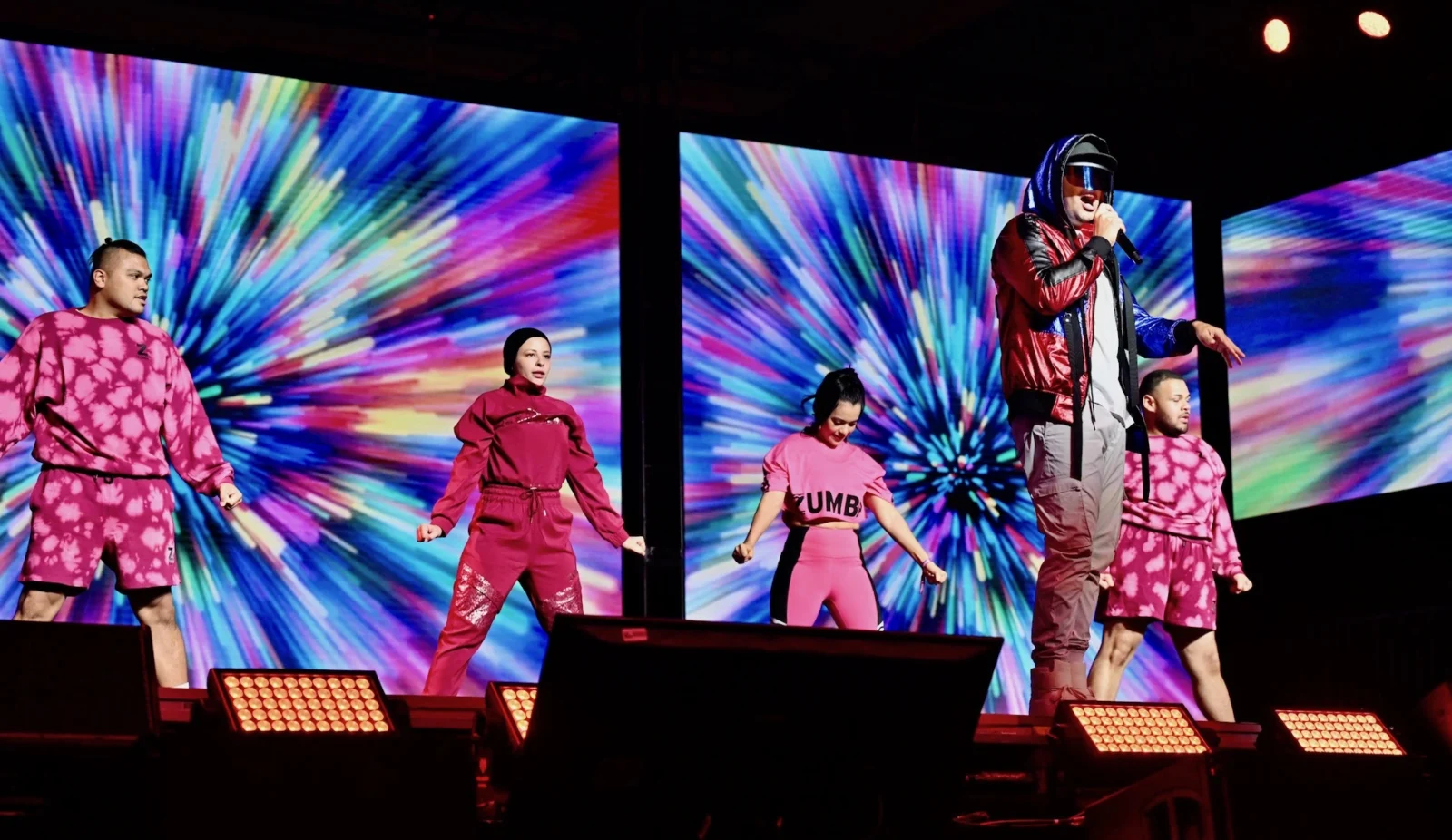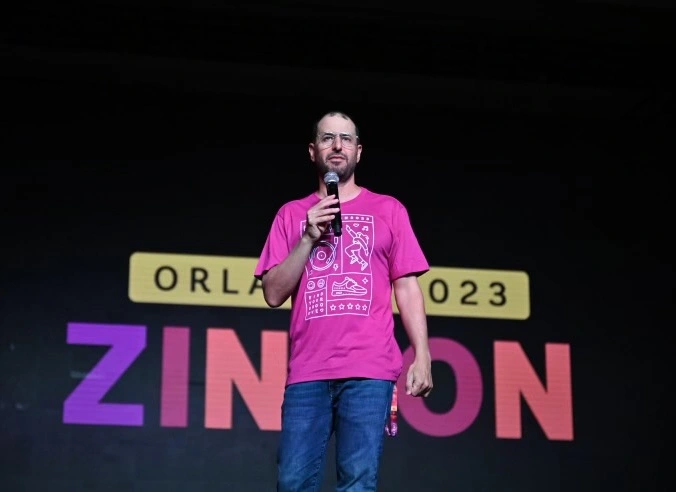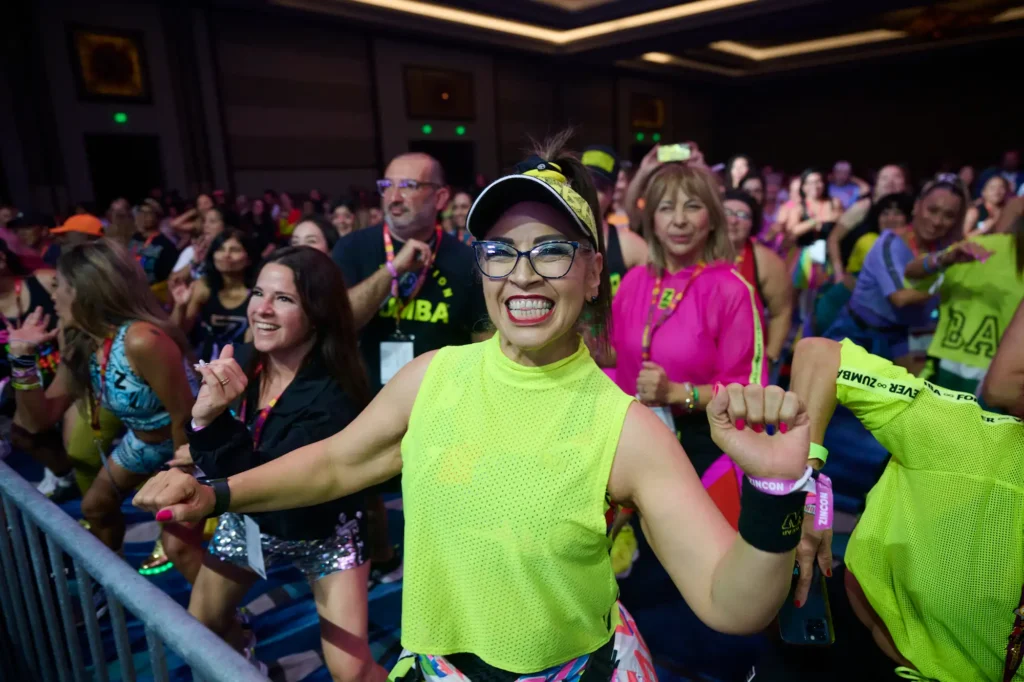More Than Two Decades On, Zumba Continues To Innovate & Inspire

Zumba CEO Alberto Perlman gave Athletech News an inside look into how the brand’s instructor-focused approach drives class attendance
When Alberto Perlman took the stage at Zumba’s recent instructor convention, you’d be forgiven for thinking you were at an Apple keynote and not a fitness conference.
Such is the almost religious-like fervor the brand engenders among its instructors, around 4,500 of whom, from over 80 countries, headed to Orlando, Florida, last month for the 14th annual Zumba Instructor Convention, known as Zincon.
Zincon 2023 featured more than 180 sessions held over four days. Among the festivities, Zumba held a “Next Rising Presenter” contest, an American Idol-style talent search where five instructor finalists performed live to see who was worthy of becoming the brand’s next Master Class presenter.
“It’s a four-day party that truly feels like the happiest place on earth,” Perlman, Zumba’s co-founder and CEO, tells Athletech News about the convention. “The Zumba nation is a community above all communities. There’s no fighting, it’s only love.”

Zumba has become so ubiquitous in gyms since Perlman, Beto Perez and Alberto Aghion created the Latin dance-inspired concept back in 2001 that it’s easy to forget Zumba is a trademarked brand and not a general fitness modality like Pilates or yoga. Behind the contagious energy that was on full display at Zincon lies a company that’s laser-focused on supporting its instructors.
“One of the things people don’t know about us is how much innovation happens inside Zumba,” Perlman says. “You won’t find a fitness brand that’s as instructor-focused and has as many innovations as we do. That’s why our instructors stay with the membership, because they get so much.”
Once they become a member of the Zumba Instructor Network (over 90% of the brand’s instructors are enrolled in the program), instructors get access to a host of tools that allow them to customize their classes, obtain certifications and learn new teaching techniques.
“If an instructor wants to teach classes for kids, we have a whole training they can take that’s exclusive to the Zumba Instructor Network,” Perlman shares by way of example. “If they want to enhance their professional education, we offer discounts with certifying bodies.“
Another feature Zumba offers is called “choreography challenge AI.” Launched last year, the feature uses artificial intelligence to coach instructors to correctly perform the dance fitness moves they plan to employ in class.
Cutting-Edge Instructor Tools
As part of Zincon 2023, Zumba unveiled several new business, marketing and music tools it will add to the Instructor Network. The innovations are designed to empower instructors to be better at their craft and ultimately drive more people into Zumba classes in gyms across the world.
This month, Zumba will be rolling out a Class Management Dashboard, essentially an all-in-one software platform that allows instructors to manage the business aspects of running their classes, including payment, attendance and scheduling. The dashboard’s most innovative feature allows people taking Zumba classes to tip their instructors.
“To the best of our knowledge, we’re the first in the world to launch tipping in the fitness industry,” Perlman says.
It’s hard to overstate the potential revenue-generating possibilities Zumba instructors stand to gain from being able to receive tips from happy class members. For many instructors, earning tips could make the difference between fitness being a side hustle or a full-time job.
“People tip their waiter or their Uber driver, but they don’t tip their fitness instructor, the person who changes their life the most,” Perlman notes.

The brand is also revamping ClassBuzz, its app that helps instructors create promotional materials using Zumba logos, backgrounds and filters. With the new ClassBuzz enhancements, Zumba instructors can now create marketing materials that are optimized for social media platforms like Instagram and TikTok, among other features.
“Imagine Canva but just for Zumba,” Perlman explains. “If an instructor wants to announce a new class at LA Fitness on Thursday mornings, for example, it’s not going to look like a normal picture with a caption, it’s going to look much better.”
On the music side, Zumba continues to push the envelope when it comes to using sound to enhance the class experience. Through the Zumba Music Lab, the brand collaborates with some of the best music makers in the world, including producers who have worked with artists like Shakira, J Balvin and Dua Lipa.
The goal, Zumba says, is to create perfectly danceable music that makes its classes more fun and increases caloric burn.
“We’ll have Brazilian funk, hip hop and Indian Bhangra all in the same song, which doesn’t exist anywhere else,” Perlman says. “We do that because the mixture is magical. It feels like you’re at a party with an incredible DJ. “
Zumba Returns to its DTC Roots
While much of the magic that powers Zumba goes on behind the scenes, the company also has a rich legacy of successfully going direct-to-consumer.
Zumba essentially rose to fame in the early 2000s by running infomercials and selling DVDs of its Latin-dance-inspired workouts, creating a global following that made it into one of the most well-known brands in fitness. More recently, the company released Zumba video games on platforms including Xbox, the Nintendo Wii and Nintendo Switch.
In early 2024, Zumba plans to launch a series of new digital direct-to-consumer products and offerings.
While he can’t get into specifics yet, Perlman says the upcoming products will expose new consumers to the Zumba brand and are designed, ultimately, to drive more people into gyms to take in-person classes.
“Traditionally, there’s a phenomenon that anytime we launch direct-to-consumer products, we see a flood of new people into Zumba classes,” Perlman says.
That should bode well for the long list of gyms in the U.S. and abroad that carry Zumba classes, particularly as the demand for group exercise continues to rise post-pandemic as people seek more in-person connection.
Zumba consistently ranks among the most popular group fitness classes in gyms around the world, including at low-cost chains like Crunch Fitness as well as more premium clubs like Life Time. Zumba’s popularity with consumers at both ends of the socioeconomic spectrum is another similarity between the brand and Apple.
One more commonality between the South Florida dance fitness pioneer and California tech giant is having a founder who’s committed to the growing brand – and serving its customers – above all else.
Zumba’s corporate offices in Miami were closed the Monday after the convention, so Perlman himself sat at the reception desk so he could greet instructors who made the post-Zincon pilgrimage from Orlando to South Florida.
“I didn’t want them to show up and for there not to be anyone there,” the Zumba CEO says. “Instructors from countries as far as Indonesia showed up, and I was giving them tours. They couldn’t believe it, but I was able to ask them: ‘What can we change?’ ‘What can we make better?’ And they gave me lots of ideas.”



